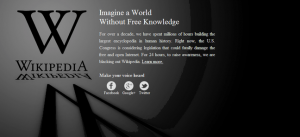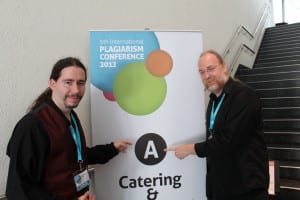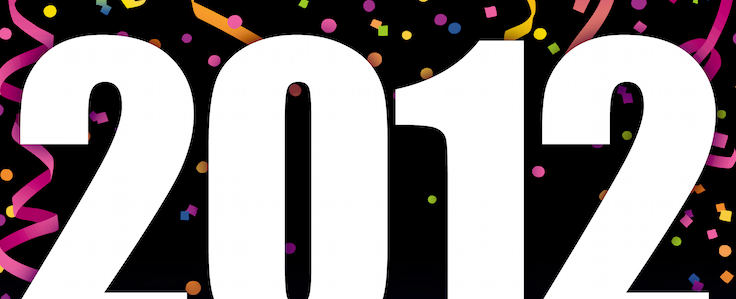10 Years of PT: 2012 – SOPA, PIPA and The Summer of Sin
 Note: This post is part of an ongoing series, you can read the other posts here.
Note: This post is part of an ongoing series, you can read the other posts here.
Heading into the year, certain groups of people were claiming that 2012 would be the end times. While, obviously, the world didn’t end in 2012, if you were following copyright and plagiarism news, it could certainly seem like it was inevitable.
The year started off with two back to back stories as the SOPA and PIPA protests took off in January only to be followed the next day by the closure of Megaupload and the arrest of Kim Dotcom, easily the largest and most important anti-piracy raid in recent years.
But, as the year settled on it was plagiarism that took off as Jonah Lehrer and Fareed Zakaria kicked off the “Summer of Sin” for journalism as it came to be known. We even saw the President of Hungary resign due to plagiarism allegations.
It wasnt any less crazy for me personally. It was another year of travel, heading again to the UK for the International Plagiarism Conference but also to SXSW in Austin and IndieConf in Raleigh, NC. It was also a year another hurricane buzzed dangerous close to New Orleans.
So 2012 might not have been the end of times, but it sure had enough storms to feel like it and plenty more were on the way.
Copyright and Plagiarism in 2012
 Copyright news in 2012 can be summarized in two words, SOPA and Megaupload.
Copyright news in 2012 can be summarized in two words, SOPA and Megaupload.
On January 18, 2012, many of the largest websites in the world came together to protest the Stop Online Piracy Act (SOPA) and its sister act the Protect IP Act (PIPA). The bills, in general, were an effort to strengthen piracy enforcement in the U.S. by requiring ISPs to block access to infringing sites as well as prohibit payment processors, advertisers and others from working with them.
The protests were the result of a long-running campaign against the bills and resulted in a deluge of calls to Congressmen. The bills were shelved by the end of the day.
As I’ve said many times before, I was never really a supporter of SOPA and PIPA. I felt the bills had many flaws and didn’t really provide any benefit for me and the people I work with. That being said, I was disappointed that the discussion around the bill focused on buzzwords and nightmare scenarios that were never really realistic (as we see in countries like the UK, with site blocking laws).
Still, the day after after the successful protests, Megaupload, the largest cyberlocker site at the time, was shuttered. It’s founder, Kim Dotcom was arrested in his native New Zealand. It was a bombshell that brought down of the largest sites on the web and one of the most popular hosts for infringing files.
The legal case against Kim Dotcom grinds on today as he battles extradition, but the site never returned. Though Dotcom launched a new site dubbed Mega, which has become fairly popular in its own right, it has never reached the heights of Meguapload.
In plagiarism news, the two word summary would be Jonah Lehrer. Lehrer was a world-renowned science journalist who had written for The New York Times, The Wall Street Journal and had just taken a job with The New Yorker when incidents of self-plagiarism were discovered in his writing.
Though, initially, it looked like his career would survive, further investigation found fabrication, traditional plagiarism and other infractions in his writing. He was eventually fired from all of the publications he worked for has has not found steady employment since, other than a $10,000 speaking gig where he gave a non-apology.
But Lehrer was just one of many to be surrounded by plagiarism. In August, Fareed Zakaria was accused of plagiarism, as was Canadian columnist Margaret Wente, but so were about a dozen other journalists, newspapers, publications or companies. The rapid fire allegations of plagiarism became known as The Summer of Sin, a name coined by Craig Silverman at Pointer.
All in all, it was a complete zoo for plagiarism and it wasn’t just journalism. Amazon faced allegations it was turning a blind eye to plagiarism by erotica authors, a viral video featured blogger Duane Lester demanding $500 from a small Missouri newspaper that had plagiarized his post and over 125 students at Harvard found themselves accused of plagiarizing on a take home exam.
All in all, it was one insane year, probably the craziest I can remember.
Most Popular Post
Using the same standard that I’ve used on other posts in this series, looking at the past 90 days of traffic, the most popular post on the site from 2012 is 5 Sneaky Plagiarist Tricks That Don’t Work.
This one is a bit of a bitter pill for me to swallow. In a year so filled with great stories, many of which were covered directly here, it was a fairly mundane story about ways that plagiarists fail to fool computers that receives the lion’s share of attention today. Even stranger, of all the posts on the site, this one is 15th overall. Meaning the most popular story of 2012 is lower than at least half a dozen articles from the year prior.
While 2012 was a major year for plagiarism and copyright news, it seems a lot of the stories haven’t really stuck around, for whatever reason.
Behind the Scenes
 Behind the scenes, 2012 was also an extremely crazy year.
Behind the scenes, 2012 was also an extremely crazy year.
First, there was a great deal of travel involved. Not only did I speak at IndieConf in Raleigh, NC, but I spoke at and attended my first SXSW in Austin. There, I spoke on a panel looking at fears of government overreach in legislating the Internet just mere months after the SOPA/PIPA protests. Interestingly, both of these trips were chances to hang out with Patrick O’Keefe, who was a co-panelist at SXSW and spoke (at a different session) at Indieconf. All the more reason it was a great year.
However, the big trip was attending the 5th International Plagiarism Conference in Newcastle, UK. I did wrap up posts from each of the two days of the event. Best of all though, I actually got to enjoy the trip and spend some time in the area afterward, meeting some great friends and generally getting to know that part of the world.
But getting back from the UK things pretty quickly got rough again. By late August, Hurricane Isaac was heading toward New Orleans. This time, fresh off the bad experience from Hurricane Gustav in 2008, which saw us evacuate into a much worse situation, we decided to stay. It ended up being the right decision, but we were without power for nearly a week, knocking me effectively offline. We recovered quickly once power was restored, but it was a tough week or so trying to get back online and help friends/family be safe and stay healthy.
Through it all, I did make time to be a guest on a few podcasts, including Internet Voices Radio (sadly the link appears to be down) and another appearance on This Week in Law.
However, one of the best things that happened in 2012 was making some great new friends at the company Distil. I covered their company early in the year and we became fast friends, working together on a several projects since. They’re one of the few companies on the Web that I personally recommend and I still enjoy working with them every chance I get.
All in all, it was a slammed year but, as long as I can put aside the heat and misery of Hurricane Isaac, it ended up being one of the best years of my life and Plagiarism Today was a key part in all of it.
Bottom Line
All in all, I remember 2012 as a crazy but great time. I took some of my favorite trips, I met some of my favorite people and even Isaac winds up being remembered more of an adventure than a disaster for me personally.
Yes, it was hot and miserable, but still the best hurricane experience I have had to date.
So, if that was the worst 2012 has to throw at me, I guess it wasn’t that bad of a year.
Still, it was definitely high drama for copyright and plagiarism. Between SOPA, Megaupload and the Summer of Sin, I can’t recall a time where I gave more newspaper interviews, wrote more frantic posts and generally raced to stay on top of everything.
So yes, it was a crazy time, but it definitely keep things interesting…
Want to Reuse or Republish this Content?
If you want to feature this article in your site, classroom or elsewhere, just let us know! We usually grant permission within 24 hours.
